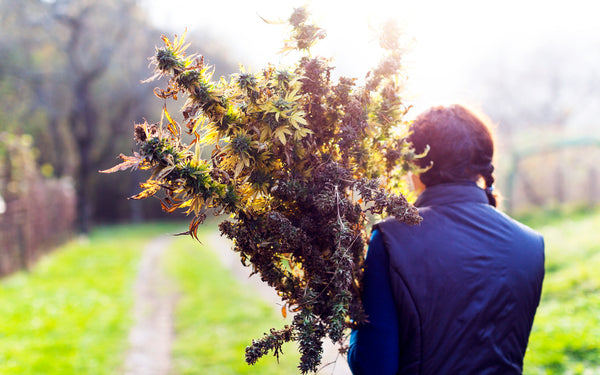For those of us growing cannabis outdoors, we get to reap the benefits of gardening in the natural world. We skip the artificial light, ubiquitous chemicals, and noisy inline fans, and instead use sunlight, living soil, and gentle breezes to nurture our plants to maturity.
Of course, the great outdoors has its downsides too, like unpredictable weather, pests, and nosy neighbors. Following these tips will help ensure a smooth outdoor harvesting process, just as Mother Nature intended it to be.
Know when to pull your harvest
All cannabis, no matter the variety, is a warm-season annual, meaning it grows and matures in one season. How long of a season a variety needs depends on where its ancestors evolved.
Those from regions close to the equator—sativa types—need a long, seemingly endless summer to ripen fully. While those from harsh, colder climates—indica types—tend to finish earlier since, well, winter is coming.
Having said that, rampant hybridization means nearly any variety you’ve got growing in your yard has a mix of both indica and sativa in its DNA. Expect them to ripen sometime between September and October in the northern hemisphere.
Keep a careful eye on pistils—the hairs that stick out from the flowers. When half of them are still upright and the other are half darkened and curled, your crop is ready for harvest.
Mind the weather
With cannabis ripening as the seasons change from summer to fall, chances are high that the weather is going through some changes. Depending on your climate, there might be cold snaps or rainstorms on the horizon.
Does this spell disaster? No way. But it does require paying attention and possibly making game-time decisions on the right time to chop, always balancing peak ripeness with conditions that could compromise your harvest.
Cold
Most cannabis plants can sail through a light freeze (28 to 32°F for up to three hours) with no trouble. A hard freeze, on the other hand—any lower temps or longer hours—will most likely spell disaster. Frost damage causes ice crystals to form within plant tissue, damaging their cells.
Leaves appear wilted before turning dark and crispy. The deeper the frost, the more of the plant that will get damaged.
Note that potted plants experience more severe temperature fluctuations than plants in the ground, making them more susceptible to frost damage.
If there’s some indica buried in a plant’s genetics, purple coloring might become much more pronounced once it gets some cold under its belt. And again, because of hybridization, don’t worry if you think you’ve got a sativa in your garden—it can likely handle a brief cold snap with no problem.
Rain
Similar to a cold snap, it’s not the rain itself that’s a huge problem, it’s the duration and severity of the storm. If it’s going to warm up and dry out quickly, you can feel fully confident in leaving not-quite-ripe cannabis to weather the storm. If the rain will be there to stay, problems with mold await. Cut your losses and harvest before things get soggy.
Note that in cold or rain—especially rain that might become hail—you can create a buffer by surrounding your plants with a few tall stakes and draping burlap or a tarp over the top. Just be certain to remove the cover when the cold/rain passes to let the plants warm up and get the sun and air they need.
Choose your harvest pacing
With artificial light and complicated pruning practices, most indoor weed ripens all at once. There can be a little more variation in plants grown outside, with outer, exposed colas ripening first, and interior, more shaded buds ripening a few days later.
Generally speaking, you’re fine harvesting all at once. But you also have the option of dividing the work, harvesting ripe ones first and leaving inner ones to soak up the sun and ripen fully for a little longer.
Get your systems in place
You’ve hopefully set up a drying room—you know, the cool dark space with a temperature that stays between 60-70°F, and humidity that remains between 50-65%.
But not so fast—how are you getting there? Use fresh tarps or rinsed out (and dried!) bins to keep your harvest clean on its path from outdoors to inside. Have different tarps or bins for each variety, and make sure each is labeled. Also make certain you’re ready for trimming with clean bypass pruners.
Go time
Make a go of it when temperatures are cool, like first thing in the morning or right before the sun sets. Intense light and high heat degrades THC.
Pest patrol
Freshly cut branches offer an easy opportunity for a close-up inspection. After chopping, hold each branch up to the light and give it a once-over. If you see anything fishy—deadened, brown, or grey areas of flower or leaves—cut them out fully and clean your shears with rubbing alcohol before making any other cuts. Any problems with fungus or mold can spread rampantly in the drying room.
Author: Johanna Silver


